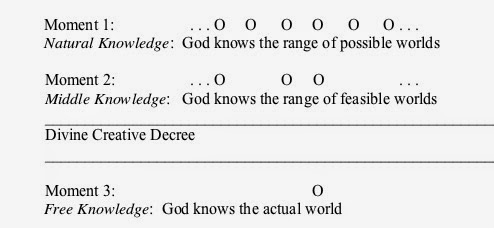Molinism and God's Infallible Plan
Turretinfan recently posted on Dr.
Anderson’s argument that on Molinism God’s decrees are fallible, because we can
choose otherwise than God decrees. (link to
Turretinfan’s post; link to Dr. Anderson’s
post).
But Dr. Craig pointed out that if the person would have chosen
otherwise, God’s decrees would have been different. Dr. Anderson then called this solution a “special
pleading” and argued Molinists should not be allowed to exclude God’s decree. His supporting reasons were 1) God’s decree implies
we will not do otherwise (he called this a relative logical necessity) and 2)
God’s decree has causal consequences. Turretinfan
accepts Dr. Anderson’s arguments and adds that sometimes prophesies are self-fulfilling
(i.e. a prophesied victory motivates troops to fight).
This is a complex business but
fortunately the answer is simple. Here’s
a chart explaining Molinism:
Dr. Anderson asks us to explain
middle knowledge in light of God’s decree.
In doing so, he redraws the chart moving the Divine Creative Decree
above moment 2. No, middle knowledge explains God’s decree not the other way
around. Nor was Molinism invented to
evade Dr. Anderson’s arguments against Molinism.
The remaining arguments say how
important God’s decree is: 1) it implies the event will happen, 2) it has
causal influences, 3) it leads to self-fulfilling prophesies. But we do not exclude God’s power to do all
these things from God’s middle knowledge, or our analysis of man’s free will.[note 1] Nor do we deny that such factors logically
imply that the event will happen. What
we deny is that God’s decree, causal influence or the causal influence of self-fulfilling
prophesies causally determine the event.
That is to say, given the causal influence of such factors, and indeed, given
all proceeding causal influences, the person retains a twofold causal ability,
such that he can choose A or ~A. Dr.
Anderson seems to recognize this when he says:
“It isn’t a causal determinism, but it’s still determinism in the sense that God’s decree that S will do A (which is fixed prior to any of S’s choices) guarantees that S will do A. Given that God has decreed that S will do A, S cannot do otherwise than A.”
While I would have worded the
conclusion as “it cannot be, that S will do otherwise than A” rather than “S
cannot do otherwise than A”, I agree with the substance of Dr. Anderson’s
comments – on Molinism, God’s decree does not lead to causal determinism but it
does imply the decreed events will happen.
So, Molinists explain God’s infallibility through infallible knowledge
and inescapable logical implications rather than causal determinism.
--------------------------------------------
Note 1 - While the decree itself follows middle knowledge, the possibility of the decree and the causal influence of the decree (and self fulfilling prophecies) are a part of God's natural knowledge. Again,
Dr. Anderson and Turretinfan redraw the chart to push moment 1 under moment
2. No, God’s power to decree, and the causal
influences His decree can have and the influence self-fulfilling prophesies
can have are all part of God’s natural knowledge and therefore helps explain
middle knowledge and man's free will.

Comments